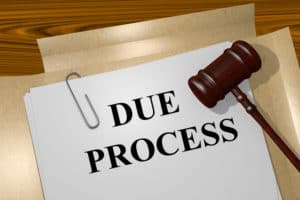
What does it mean? Why is it important?
Does the BVA really provide Due Process or are they just giving it lip service?
This post will cover all those questions – and we will give the BVA a grade for its performance in providing Veteran’s Due Process….the scale we will use is the A through F scale from elementary and high school.
What is Due Process – and Why is It Important?
Due Process is a concept of Constitutional Law – it is first referenced in the 5th Amendment of the US Constitution, where it is said that no American citizen shall be “deprived of life, liberty or property without due process of law.”
The phrase “Due Process of Law” has a long history in Western Jurisprudence.
While there are some that argue that due process had its origins and first application in the quasi-jury like proceedings of the pre-medieval Germanic tribes, the concept largely comes into Western Jurisprudence at the time of the signing of the Magna Carta.
Our Founding Fathers believed VERY strongly in the concept of Due Process – so much so that they enshrined it in the Constitutional Amendments.
It is these first 10 Amendments – the Bill of Rights – which serve as quintessential limitations on the powers that the American people have bestowed to the Federal Government in Articles I, II and III of the US Constitution.
That is to say….Due Process is a RESTRAINT on Federal Government power and authority.
And the restraint operates in 2 ways.
First, it requires the legislature to provide – at a minimum – procedural “due process” in the text of any law that impacts a fundamental right.
Second, it requires that the Executive Branch – whose responsibility it is to EFFECTUATE and ENFORCE the laws of Congress – to fulfill the requirement of Procedural Due Process in its operations and actions.
Third, the Judicial Branch serves as a Check and Balance on the other 2 branches – the Judiciary has authority to strike down any Congressional law that violates Due Process of law, or reverse or stop any Executive Action taken without Due Process of Law.
Confused?
Welcome to Constitutional Law.
Here it is in a nutshell:
- Veterans have a Constitutional Property Right in their VA Benefits. Cushman v. Shinseki, 576 F.3d 1290 (Fed. Cir. 2009).
- Prior to the deprivation of a property right, a law passed by Congress must outline adequate procedural due process protections.
- When the VA (Executive Branch) seeks to enforce that law, it must provide procedural due process.
- The Judiciary must ensure that both other branches are providing Veterans with the full array of what is commonly understood to be “Due Process of Law”.
So we know that the Veteran has a right to Due Process of Law – at least since Cushman – that begs a couple of questions.
First, what exactly constitutes “due process of law”, and second, how does the BVA provide Due Process of Law to the Veteran?
What Must the Government do to Provide “Due Process” of Law?
If you blend together all of American Jurisprudence on the topic of Procedural Due Process, you will find that there are 8 components that make up Due Process.
- Adequate Notice
- Unbiased Decision Maker
- Absence of Ex Parte Communication
- An Opportunity to be Heard
- Right to Present Evidence
- Prompt Decision Making
- Record of the Proceedings
- Written Decisions based on the record, supported by fact and reason
The BVA and Due Process: Pass….or Fail?
#1 Adequate Notice is THE First Step in Providing Due Process.

So any time the VA (or the BVA) takes an action in your claim or appeal, it must provide you with adequate notice.
It must tell you about the action it is taken.
It must ALSO tell your attorney or representative.
If the VA does NOT tell you – and your representative – about the action it has taken to deprive you of your constitutional property right, then there is a damn good chance there is a Due Process violation.
Only totalitarian states seize property in the dark of night; regrettably, the VA bureaucracy often steals away like a thief in the night to take away your rightful benefits.
The Veterans Law Blog gives the BVA an “F” in providing Adequate Notice. Here’s why:
Reason #1: The BVA rarely sends its decisions to Veteran’s representatives. In soliciting stories from advocates prior to writing this post, I received word from dozens of attorney and non-attorney advocates who all said: we never get copies of the Board’s Decisions unless our client sends them to us. Is this a representative sample? Probably not, but where there’s smoke, there’s probably fire.
Reason #2: The BVA’s “right hand”, the Appeals Management Center, frequently sends out decisions which state on their face that they are a Final Decision of the Board….but which turn out later to NOT be a final decision of the Board. Or they are, but the Veterans Court doesn’t recognize them as such. Until the BVA can provide notice of what an action IS, what ACTUAL appeal rights flow from it – and provide that notice every time to a Veteran and their representative – it cannot get a passing grade in Constitutional Due Process.
Reason #3: The BVA often makes decisions without providing documentation and evidence relevant to the decision to the Veteran or their representative. This is particularly true when the VA goes out and procures a medical opinion – advocates tell us that they often never see the request, exam notes, or opinion until AFTER the BVA issues a decision.
#2: Without an Unbiased Decision Maker, There is No “Due Process”.

The BVA, for example, is both a party to the claim (as the representative of the VA Secretary) and the adjudicator of that claim (as the Hearing Official) from the moment your appeal is filed to the day (often decades later) that the BVA gets around to adjudicating your appeal
We have ALL seen it – the VA Regional Offices and the BVA – will jump backwards through hoops to find ways to under-cut claims and appeals by Veterans.
So the question bears asking: if the VA as an Executive Agency has a vested interest in the outcome of an appeal, from budgetary and other perspectives, how can the VA Raters and the BVA decisions comport with Due Process by providing a fair and impartial review of a decision?
It’s a good question, particularly in the context of what the VA likes to call a “non-adversarial” and “veteran-friendly” process, and one that I suspect that soon enough the CAVC and Federal Circuit will have to wrestle with.
Until then, the BVA gets a “D” in acting as an unbiased decision maker – they are clearly not unbiased, as their boss is the same VA Secretary whose other employees messed up the decision.
But, that’s the way Congress stacked the deck for the government, so we cannot entirely blame the BVA.
And a handful of the Hearing Officials at the BVA do strive to be objective – some of those same BVA Judges read this blog, and even more are willing to be transparent about the BVA process and talk to me and my fellow Vets at Regional Offices, or at chance encounters at conferences.
To those Judges, I apologize for any suggesting that you are less than a professional – we are working on tools at the VeteransLawBlog.org to allow Veteran to review and rate BVA Judges… so that those who are professional, objective, and define what it means to be a Judge can be recognized as such.
Several BVA Judges have told me about their colleagues who are so tainted with cynicism for Veterans and VA Claims that the cynicism clouds their ability to be fair and impartial.
I want to be very clear: I can list over a dozen BVA Judges and BVA employees for whom I have an incredible amount of respect – BECAUSE of their objectivity, and BECAUSE they bend over backward to ensure fairness and objectivity.
But enough BVA Hearing officials do not provide a high degree of objectivity and impartiality that the Veteran community and the public lose – or have lost – all faith in the fundamental fairness of the BVA appeal process.
#3: Due Process Cannot Exist When There are Ex-Parte Communications.
Ex Parte communications are the subject of endless debates.
Generally speaking, an “ex parte” conversation occurs when a party (or representative of a party) discusses a case before an adjudicator WITH that adjudicator….outside the presence of the opposing party or their representative.
The VA gets around all that pesky “Ex Parte” nonsense by claiming that because the VA Claims process is supposed “non-adversarial”, there is no “opposing party”.
That’s some pretty fine “hair-splitting” – here’s how it seems from the Veteran’s side of the table:
If the process is “rigged” against the Veteran from the get-go, it doesn’t matter WHO the adjudicator talks to about the case when the Veteran or their representative are not present.
For that reason, we won’t give the BVA a grade in this element of Constitutional Due Process; the system is designed for ex parte communications, and the VA takes advantage of what Congress has given it to work with.
#4: An Opportunity to be Heard is Crucial to “Due Process”.

In fact, all 8 of the elements of Due Process that are listed here can be boiled down to these 2 things.
After being denied access to benefits, the Veteran has one – and only 1 – opportunity to be “heard” in his or her VA appeal: at the BVA. (The Veterans Court is not a finder-of-fact and in most cases, can only adjudicate proprietary in the Board’s application of law and regulation).
The BVA does at least give an opportunity to be heard. I have had the opportunity to attend many, many BVA hearings, as both a Veteran and an advocate.
What I will say is this – the BVA does provide the hearing – the opportunity to be heard.
Though it can take 5-8 years, they do almost always hold a hearing if one is requested.
However, the BVA’s failure to give adequate notice of these hearings in many cases (we had to file a writ because the BVA never sent us notice of a hearing – which we found out about from our client) is what keeps it from getting an “A”.
Further, whether the hearing itself is conducted fairly depends largely on which Hearing Official you get. Some listen, some ask questions, and some try to really get down to “brass tacks” to understand the unique factual contours of each case. Many others simply shape the record to achieve the outcome they have pre-ordained.
So, when it comes to providing an opportunity to be heard, we give the BVA a “B” … but if we could evaluate the QUALITY and FAIRNESS of the proceedings, our rating would likely be a lot lower.
#5: Key to the Concept of “Due Process” is the Right to Present Evidence.

You go to hearing, present your evidence, and the BVA Hearing Official makes a decision. Due Process accomplished.
Not so quick.
The right to present evidence INCLUDES the right to present evidence that the other side’s evidence is horse-puckey, or Junk Science.
In real courts, this component of Due Process is fulfilled not just by a person’s right to CALL witnesses at a hearing, but the right to CHALLENGE (through other testimony, evidence, or cross-examination) the other sides’ witnesses or evidence.
As the Supreme Court told us in Goldberg v. Kelly, 397 U.S. 254 (1970), in almost every setting where important decisions turn on questions of fact, due process requires an opportunity to confront and cross-examine adverse witnesses.
Maybe more importantly, this element of Due Process is fulfilled by the right to “discover” the other party’s evidence.
This is where the VA Benefits system – and the BVA in particular – falls well short of the mark of constitutional Due Process.
Veteran are rarely allowed access to the VA records, VA doctors, VA Doctor credentials, the VA expert questions and methodology and procedures.
They are deprived the right to see evidence the VA or BVA has in other cases that might be helpful in your case.
Take for example, a recent case where a Veteran proved exposure to Agent Orange in Korea, well outside the time that the VA has conceded that spraying occurred.
This information is clearly relevant and material to any other Veteran that served on the same base at the same time as Veteran and has similar claims – but the VA is not legally obligated to provide it.
I can think of countless other scenarios where the VA has evidence in one Veteran’s claim that might be dispositive of another Veteran’s claim – but they are not legally bound to provide it to that second Veteran.
If they are not required to produce material, probative and relevant information to support you in your own claims and appeals, how can you adequately present evidence in your own claim or appeal?
The answer is you cannot.
If you were a Federal employee suing for discrimination at an administrative hearing of the EEOC, you get discovery rights.
If you were a Federal employee who was fired from your government job – and this includes the very VA and BVA employees involved in adjudicating your benefits claim and appeal – you would get discovery rights before the Merit Systems Protection Board.
But Veterans have NO right to discovery –NO real opportunity to study all the evidence that the VA has in its custody or control – evidence which might actually change the outcome in a given Veteran’s case.
Until the day where the Veterans is allowed the same right to discovery that anyone else suing the government for wrongfully denying benefits gets, the BVA will get an “F” in this category of Due Process.
#6: Prompt Decision Making.

Not to be too horribly snarky, but this is a bone of contention for 98% of Veterans waiting for their BVA Decisions – the only thing that the VA and BVA excel at is promptly making excuses why they cannot promptly issue decisions.
Let me talk, for a moment, about my own case. Simple issue, simple claim. (Tinnitus is the key remaining issue)
I filed it in 2007. It’s been “on appeal” since 2008. The BVA held a hearing in March 2015. Today, in August 2016, there is still no decision in sight.
In the 8 years on appeal, here’s what has happened:
* My son was born, learned to talk & learned to walk – though it took him a little longer than neur0-typical kids because of his diagnosis;
* We have had 2 – almost 3 – Presidential elections;
* Apple has gone through SIX generations of iPhones;
* Clayton Kershaw – a rookie pitcher on the LA Dodgers in 2008 – has (as of July 2016) pitched 260 games, 1,730 innings of baseball, won 3 Cy Young awards, played in 6 All-Star Games, won the Roberto Clemente Award, the National League MVP, and much, much more. Almost a Hall of Fame worthy career in the books…while the BVA struggles with issuing a simple decision.
The BVA delays are BEYOND “backlogs”.
The BVA, as an entity, crossed into the realm of incompetence and dysfunction long ago, but nobody wants to come out and be the first to say it.
And I hesitate to say it, because I have so much respect for so many BVA employees and leaders who are really working hard to turn the tide.
It’s not entirely the BVA’s fault – the system is crumbling around us, and others are not giving them the tools they need to do the job, or even questioning whether the BVA is still a relevant or necessary part of the appeals process.
Congress refuses to hold the VA’s feet to the fire and doesn’t do anything more than throw a few angry sound bites towards the VA.
And the Veterans Court is quite happy to enable the VA’s excuses and delays – in all the decades the Court has been here, have they ONCE pushed the VA on the delays?
Not that I can recall.
Instead, we read far too many Veterans Court decisions that start “While the long delay is regrettable….” or “While we sympathize with the delay…”
Due Process delayed, is Due Process denied.
The BVA gets an F in failing to provide prompt adjudication of appeals.
#7: Due Process requires a Record of the Proceeding.

While it may add months or years of delay to your appeal, you can get a copy.
And, so long as nobody loses the Gramophone on which your hearing was recorded, you’ll eventually get a copy of the record.
Lawyers in other legal settings have long had the advantage of real-time transcripts.
Back in the day when I did trial work as an IRS and private employment attorney, I used to plug my laptop in to the Court’s Reporters setup – as I took a deposition, or questioned a witness at hearing or trial, the transcript was generated in real time on my computer.
It was usually certified accurate within hours or mere days by the Court reporter.
So, the BVA can do better – a lot better – but at least they provide the record (if you ask).
For that, we’ll give them a C.
#8: A Written Decision Based on the Record and Supported by Reasons and Findings of Fact.

But that has always been because a Congressional statute requires it. 38 USC 7104(d)(1).
Here’s a tip for lawyers out there – look for opportunities to challenge a BVA decision as violative of Constitutional Due Process when, for example, the BVA uses the wrong Veteran’s file to deny the claim, or relies on mis-filed evidence, or completely abrogates his or her duties under the law to provide adequate reasons and bases for his or her decisions.
These types of situations go so far beyond what could possibly be supportable by law or fact that they may almost constitute a “per se” violation of constitutional due process.
Per se is a fancy lawyer word that means “in and of itself” or “without further proof”. Don’t confuse it with pro se which is another fancy lawyer word that means “someone that represents themselves without a lawyer”.
So how does the BVA score in this category of Due Process? We’ll give them a D. Why such a low grade?
2 Reasons.
First, rather than weigh evidence and issue decisions finding flaws in VA Regional Office logic, development, analysis or application of the law, the BVA far too often “remands” cases, or rubber-stamps decisions and abdicates its duty to provide well-reasoned decisions.
Second, one of the more common reasons that BVA Hearing Officials are reversed at the Veterans Court is because they issue decisions that fail to provide “adequate reasons and bases“.
The Final Grade on BVA Due Process.

Academically, you can probably pass with a D.
But, when so many Veterans have died to protect this judicial system – in which Due Process is THE fundamental core requirement – I would hope we’d see more focus on providing due process to Veterans.
Said another way – Veterans should be able to enjoy ALL the rights of the judicial system they fought, bled, and sometimes died to preserve. Especially Due Process of Law.
Unfortunately, the BVA too frequently, sees to it that Veterans get No Process of Law.
Author’s Note: Incidentally, as of August 2016, the BVA has a new Executive in Charge coming in – Carol DiBattiste.
My good friend Ben Krause over at DisabledVeterans.org had a chance to visit with her by phone, and here is his report.
Ms. DiBattiste has a long and interesting resume. To highlight just a few things – she served in the US Air Force, starting out in the enlisted ranks. She served as General Counsel for ChoicePoint, a TSA Administrator, Under Secretary for the Air Force, US Attorney for the Southern District of Florida, and in 1991 investigated several high ranking members of the US Navy for their role in the Tail-hook Scandal (click here to read an interesting quote from Ms. DiBattiste on the experience of making the recommendations her team made).
My guess is that this job is a stepping stone for higher office – my prediction is that she will be a top name mentioned when a privacy or government data security scandal takes Bob McDonald down in the early years of Clinton II Administration. I hope I’m wrong – I really like “Bob” and the work he is doing; but I know the power of the entrenched interests in the VA and the Iron Triangle of Veterans advocates to take down folks that are in the way.





